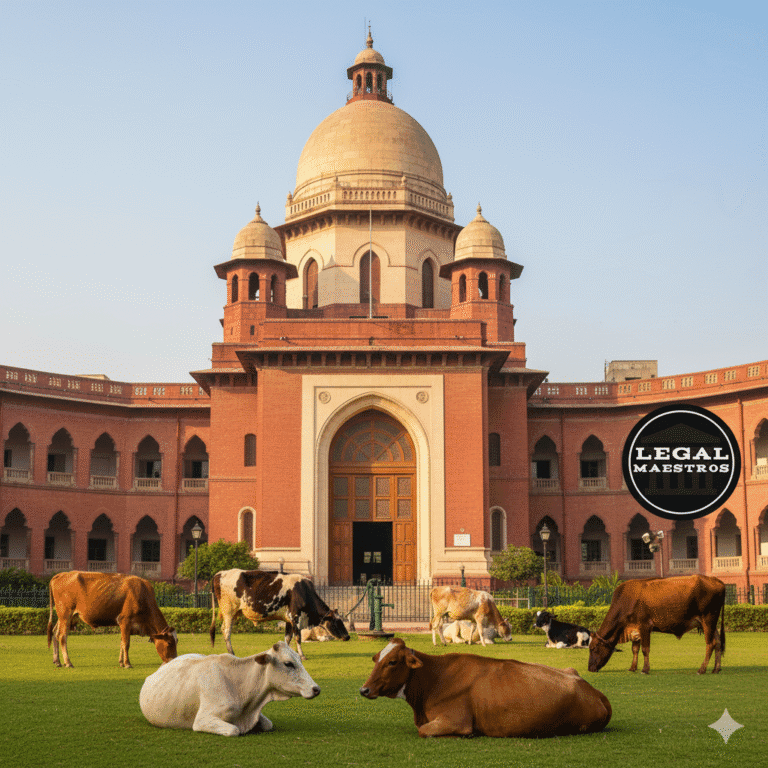
Andhra Pradesh High Court Rules CBI Director’s Tirupati Laddu Probe Delegation Violates Supreme Court Order
Facts of the Case
Alright, so imagine this: it’s July 2025, and Mr. Kaduru Chinnappanna—yeah, that former bigwig from Andhra Pradesh—has just had enough. Dude storms in and slaps down a writ petition, waving Article 226 around like a battle flag. He’s basically yelling, “Hey, someone needs to dig deep into this whole shady ghee-in-the-prasadam mess at Tirupati Tirumala.”
Why are you tossing me notices and pretending you’re the “investigating officer’?” Yeah, spicy.
And Chinnappanna’s not stopping there. He’s begging the court for some interim protection under Section 151 of the Civil Procedure Code—because, you know, he kinda wants to stay alive and maybe, just maybe, see an actual honest investigation happen. Can you blame the guy?
For any queries or to publish an article or post or advertisement on our platform, do call at +91 6377460764 or email us at contact@legalmaestros.com.
Legal Provisions Invoked
So here’s the deal: The petition basically leaned on the High Court’s magic wand—Article 226, you know, the one that lets it hand out writs when someone’s rights under Articles 14 and 21 (the biggies: equality before the law and don’t-mess-with-my-life-or-liberty) are on the line.
While the main case was crawling through the system, lawyers whipped out Section 151 CPC—consider it to be the “in case of emergency, break glass” section—to ask for security and to keep anyone from pulling shady moves while the whole writ drama played out.
However, the crux of the entire issue was whether everyone adhered to the Supreme Court’s landmark order, WP(C) 622/2024, which was issued on October 4th, 2024? The top court summoned a serious Special Investigation Team (SIT) consisting of two representatives from the CBI and state police, as well as one from the Food Safety and Advisory Institute (FSSAI), all under the supervision of the CBI. What is the genuine inquiry? Did anyone actually bother to do what the Supreme Court told them to do?
For More Updates & Regular Notes, Join Our WhatsApp Group (https://chat.whatsapp.com/DkucckgAEJbCtXwXr2yIt0) and Telegram Group (https://t.me/legalmaestroeducators): contact@legalmaestros.com.
Fundamental Issues
So, the High Court basically had to figure out if this guy, Mr. Rao—who, by the way, wasn’t even mentioned when the Supreme Court set up the SIT—could just waltz in, play detective, and start sending out summons. Man, it was just pure chaos. People started arguing—like, really yelling—about whether you gotta follow the Supreme Court’s word no matter what, especially when the stakes are high and the case is touchy as hell. Then there’s this one guy just throwing shade, basically saying, “Seriously? If some rando who isn’t even supposed to be here starts bossing people around, what’s even the point? Feels shady as hell.
Court’s Decision and Reasoning
Yeah, so Justice Harinath N basically said, “Listen up, the Supreme Court set up this SIT—only they get to pick who’s in it. The CBI director can’t just throw in another officer because he feels like it.” The judge was pretty blunt: adding extra people not in the original order is straight-up ignoring what the Supreme Court said, and honestly, it just makes people lose trust in the whole process. He pointed to old cases where courts were super strict about following their own rules. The High Court went, “If you mess with this, you’re basically going against the judges and messing up the whole investigation.” So, long story short, the court sided with the petition and told the CBI director to stick to the actual SIT as it was set up; no freelancing allowed.
Implications of the Judgment
So, this ruling kind of hammers home the fact that when the Supreme Court lays down the law on setting up an investigative body, that’s it—no sneaky workarounds by the government or the cops. The court’s setup cannot be circumvented without the approval of the judges themselves. And honestly, by keeping the SIT independent, especially in those messy cases that rile up religious feelings or mess with public trust, the court’s basically saying, “Yeah, we’re serious about justice—not just looking fair, but actually being fair.” It’s a big win for the whole rule-of-law thing and, honestly, a reminder that you can’t just fudge the process when something real is at stake.







